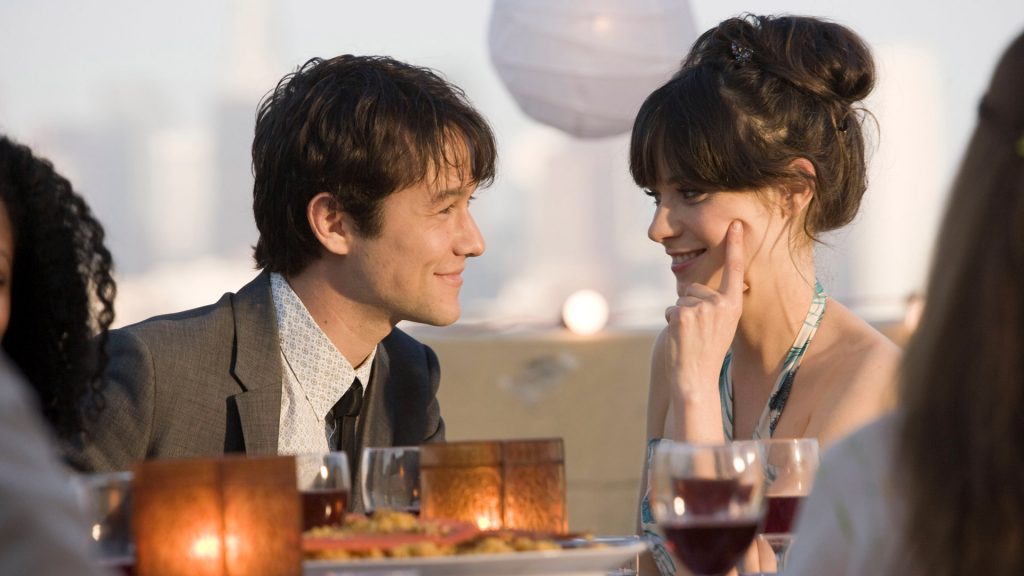
Worth Your Time?: Four movies for the heartbroken, or an exploration into doomed romance
By Nicholas Cervania, February 15 2022—
As the name suggests, the “doomed romance” sub-genre of love stories focuses on romances that do not work out. I’ve always found that the best doomed romance stories generally focus more on the protagonist’s growth as a result of their experience, rather than just simply how they end up with the person, like most standard romance stories.
In this article, I wanted to talk about four different doomed romance films that focus on heartbroken characters.
(500) Days of Summer

I’ve already talked about this movie at length in a previous article but I’ll summarize what I said before.
(500) Days of Summer is a lighthearted deconstruction of the manic pixie dream girl trope. While someone can come across as “perfect,” perfection isn’t depth. Failure to recognize somebody’s flaws is failure to see them as a person. This often leads to one partner placing the other on a pedestal, which not only sets them up for disappointment but puts pressure on their partner and their relationship.
Tom (Joseph Gordon-Levitt) does this with Summer (Zooey Deschanel) and that’s what causes his pain. Summer initially doesn’t want a serious relationship but Tom sees her as his soulmate. As such, it’s devastating for him when they break up. This pain is furthered by the film’s presentation of a non-linear narrative, directly juxtaposing the time they spent together with time after they’ve broken up, allowing us to see Tom’s pain after their relationship’s end.
While the existence of soulmates and true love has yet to be contested, Tom learns that it’s a mistake to assign cosmic significance to earthly events. Sometimes coincidences happen and fate and destiny have nothing to do with it. While painful, when a relationship ends, it can be a chance to look back on and learn from your own mistakes, as well as improve upon yourself.
Her
Joaquin Phoenix plays Theodore Twombley, a man who works writing greeting cards for other people in the technologically advanced near future in LA. Unlike the other films in this list, the heartbreak in Her doesn’t come from the main doomed romance of the story.
Coming off of a recent divorce, Theodore begins the film melancholic and lonely, with his dejected and heavy-hearted performance allowing for a disarming connection with the audience.
While he can connect other people with his job, Theodore has trouble connecting others to himself — a problem that caused the downfall of his previous marriage. He isolates himself from those around him, avoiding social interactions and group events until he meets Samantha (Scarlett Johannsen). Samantha is an artificial intelligence, built into Theodore’s newly purchased operating system, whom he falls in love and begins a relationship with.
Due to her physical limitations, the only way Theodore can connect with Samantha is emotionally. Theodore’s relationship with Samantha teaches him to open up to others and how allowing yourself to be vulnerable around others can sometimes be a rewarding experience.
Luckily for Theodore, he never has to be without Samantha. He can keep her in his shirt pocket as he goes through his day and talk to her at any time through his earphones. Theodore never has to do any growing without having Samantha around. However, the same cannot be said for Samantha. As a higher intelligence, Samantha is constantly growing and evolving and at a much faster rate than any human can even imagine. Because of this, she quickly outgrows Theodore.
Among other themes, Her addresses the disconnection borne from the ease of connectivity brought on by our growing dependence on technology. The overabundance of connectivity we gain from the integration of technology within our lives often has us feeling more disconnected than we were without it.
Blue Valentine
What happens after, “happily ever after?”
Dean (Ryan Gosling) first meets Cindy (Michelle Williams) while he is working for a moving company while she is a student studying pre-med. After she is faced with an unplanned pregnancy, she breaks up with her boyfriend and begins dating Dean, who reassures her that he will raise her baby with her, despite not being the father.
Were this any generic love story, this is where their story would end — but it doesn’t. Five years later, Dean and Cindy are married and raising their child together and we see their life together is far from bliss. Cindy works as a nurse and Dean paints houses while struggling with his alcoholism. Whenever the two are together, Dean acts immaturely and undermines Cindy in front of their child, putting strain on their relationship. As such, Cindy is forced to act as the only adult in the household.
When Dean and Cindy were young, immaturity came across as romantic and passionate. But now because of Dean’s lack of maturity, their marriage has grown stale and devolved into quiet repulsiveness. While Dean is still in love with Cindy, she has grown a distaste for the life they built together. Similar to (500) Days of Summer, Blue Valentine juxtaposes scenes of the beginning of their relationship with the end of their relationship but in a much more somber way, showing how the once intense romantic feelings they had for each other have quietly relinquished themselves to a tense marriage devoid of any kind of hope.
In an attempt to rekindle their younger passion, Dean books a themed motel room for him and Cindy — the “future room.” Representative of the relationship between the two, the “future room” is dark, cold and lifeless. It isn’t until Dean suggests having another child that Cindy realizes they should never have gotten together in the first place.
Dean and Cindy’s relationship had started on a difficult foot and was rushed even further by Cindy’s pregnancy. Despite their good intentions, their volatile relationship was never one that was built to last. In its raw and heartbreaking presentation of a marriage on its last legs, Blue Valentine is a grim reflection of how sometimes the things we love in our partner can often become the reason we grow to hate them.
Eternal Sunshine of the Spotless Mind
Eternal Sunshine of the Spotless Mind begins with Joel Barish (Jim Carrey) meeting Clementine (Kate Winslet) when he spontaneously decides to skip work and travel to Montauk. Once meeting, the two fall in love and spend a passionate night together.
However, after this it’s revealed that Joel and Clementine had been in a two-year-long relationship before their meeting in Montauk and that both have undergone a procedure to erase the other person from their memory. From there, we follow Joel’s perspective of his procedure, following their relationship from its end to its beginning, watching events play out in reverse chronological order. But, as Joel reaches earlier and long-forgotten happier memories of him and Clementine, he realizes that he doesn’t want to forget her.
With a beautifully melancholic and forlorn score by Jon Brion, Eternal Sunshine of the Spotless Mind is a reminder that our struggles — both good and bad — define who we are today. What is our identity if not a culmination of our memories and experiences?
Memories are not isolated files that can simply be deleted or rewritten. The lessons we learn are ingrained into our identity and our behaviors can’t be easily overwritten, as seen by the impulses that led to Joel and Clementine falling in love once again. Joel and Clementine’s failed and subsequent newfound relationship speak to the pointlessness of trying to forget your past. It’s as the old saying goes, “I can never forget you, no matter how hard I try.”
